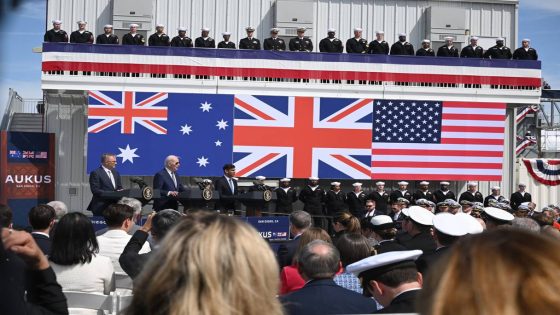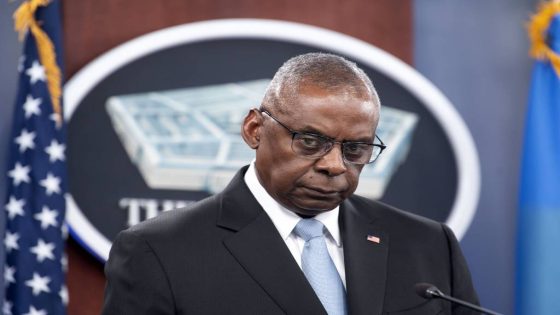The U.S. is gearing up to give Australia and Britain a broad exemption to Washington’s export control regime in hopes of enabling a key pillar of the AUKUS agreement focused on facilitating joint development of advanced defense technologies.
But before the U.S. issues that exemption, it wants Australia to adopt export control laws similar to its own. And several Australian defense companies are unhappy about legislation pending in Australia’s parliament that would replicate a U.S.-style export control regime.
They say importing the stringent U.S. export control laws could hinder their ability to effectively collaborate and do business with non-AUKUS countries.
Australia and Britain have long sought a carveout within Washington’s International Traffic in Arms Regulation, or ITAR, export control regime. Defense companies in all three countries have argued ITAR’s rigorous restrictions on sensitive defense exports stymies a key AUKUS goal of jointly developing disruptive technology such as quantum computing, artificial intelligence and hypersonic weapons.
The U.S. Congress passed legislation in December to give Australia and Britain an ITAR exemption for AUKUS, on the condition that both countries implement similarly tough export control laws. Canada is currently the only country to enjoy a special ITAR exemption.
Before Australia and Britain receive their exemptions, Secretary of State Antony Blinken must certify they have each implemented comparable export control regimes.
Michael Biercuk, the chief executive of Q-CTRL, an Australian firm specializing in quantum technology that has offices in Sydney, Los Angeles and London, said the company is “supportive of the idea of making a control-free zone, if you will, between Australia, the U.S. and the U.K. in support of AUKUS.
However, “we don’t think the right way to do it is to bring in the totality of the system that everybody in the world says doesn’t work,” he added, noting the policy would “fundamentally limit exports outside of that AUKUS bubble, and this is not something that is helpful to the local community of vendors who are heavily reliant on export markets.”
Andreas Schwer, the chief executive of EOS, an Australian company specializing in high-tech remote weapons stations, directed energy and counter-unmanned aircraft systems, told Defense News stricter, more ITAR-like regulations in the country “will make life extremely difficult for us to export into any non-AUKUS country.” He said it can sometimes take six months to a year to get simple upgrades formally approved for NATO allies under ITAR.
“This is something which is hated by most of the western European procurement agencies,” said Schwer. “That’s the reason why they always prefer non-ITAR offers. I expect that the same will happen with Australian products. As soon as we have similar regulations in place, they will also say we don’t want to have Australian ITAR components.”
But proponents of ITAR argue it’s a crucial tool for keeping U.S. technology out of the hands of rivals such as China and Russia. Mike Burgess, director general of the Australian Security Intelligence Organisation, warned last year of an uptick in online espionage attempts aimed at the country’s defense industry since AUKUS was announced in September 2021.
U.S. Under Secretary of State for Arms Control Bonnie Jenkins told lawmakers this week the U.S. must “make sure that we protect our intellectual property.
“We know there’s countries like China who want to steal information,” she added.
Jenkins noted Britain updated its espionage laws in July 2023 as part of the National Security Act and pointed to Australia’s proposed export control overhaul pending a review in parliament.
Biercuk said the Australian proposal was “rushed” and called it “a catastrophically bad piece of legislation.”
Still, NIOA Group chief executive Rob Nioa, noted “really what the U.S. wants to do is protect U.S. [intellectual property. “If it was technology that originated in America, it was always subject to those controls,” Nioa told Defense News. “Our concern will be if that captures Australian uniquely produced intellectual property and prohibits it from going to other places.”
NIOA Group is an Australian munitions company which also owns U.S.-headquartered Barrett Firearms and has a joint venture company with Rheinmetall.
Yet, he added, a comparable Australian export control regime “might streamline” some export approval processes by allowing Canberra to administer them “instead of having to go back to the U.S. for approval.”
“Until we see how it’s implemented, I’m not going to automatically panic,” he said. “People are nervous about it though in Australia because people are nervous about the unknown.”
Bryant Harris is the Congress reporter for Defense News. He has covered U.S. foreign policy, national security, international affairs and politics in Washington since 2014. He has also written for Foreign Policy, Al-Monitor, Al Jazeera English and IPS News.
Jen Judson is an award-winning journalist covering land warfare for Defense News. She has also worked for Politico and Inside Defense. She holds a Master of Science degree in journalism from Boston University and a Bachelor of Arts degree from Kenyon College.
Source Agencies




